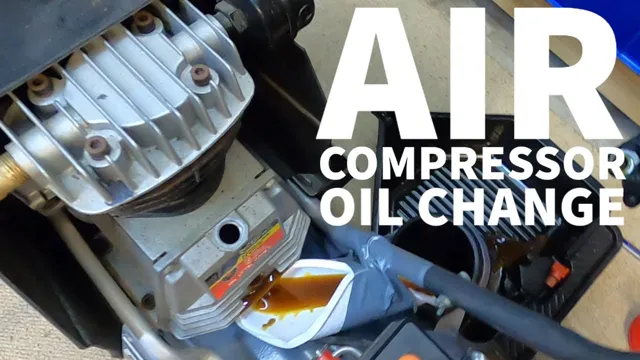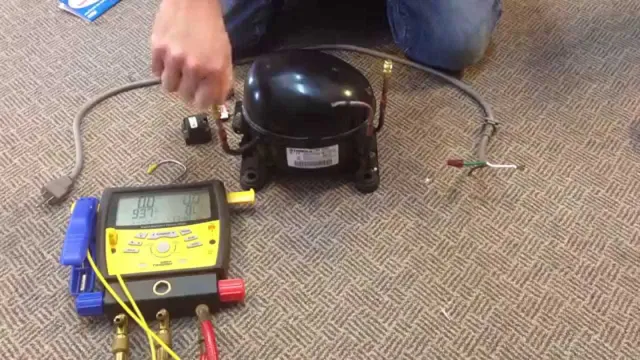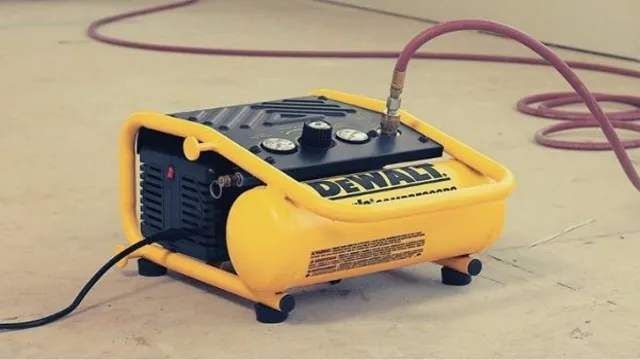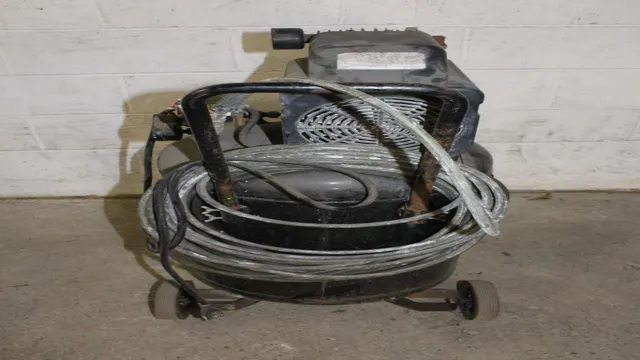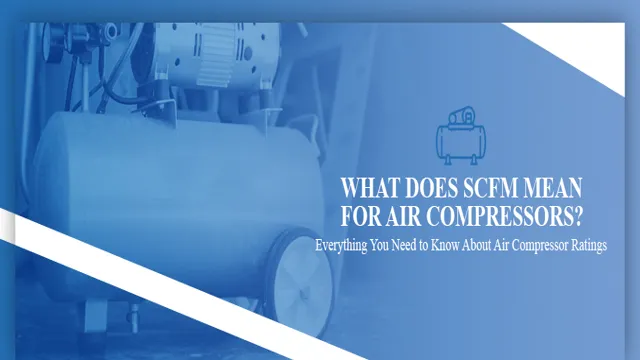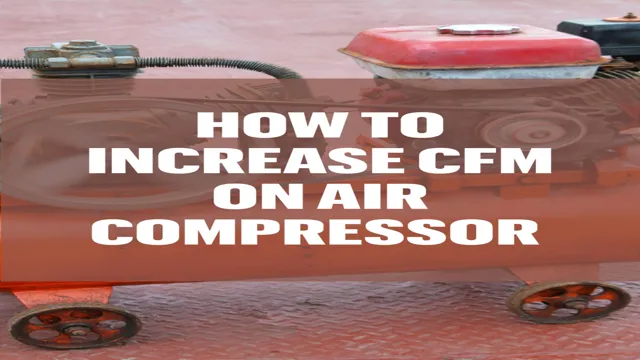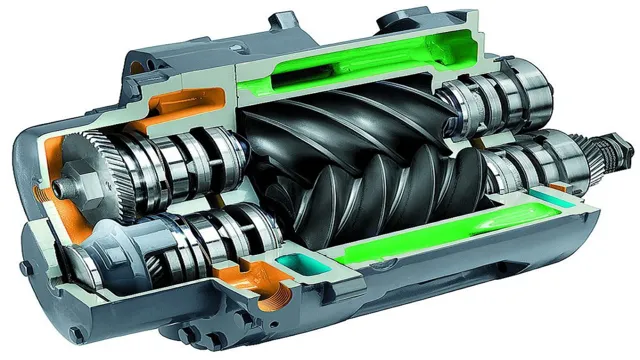How Much Electricity Does an Air Compressor Use: A Comprehensive Guide to Energy Efficiency
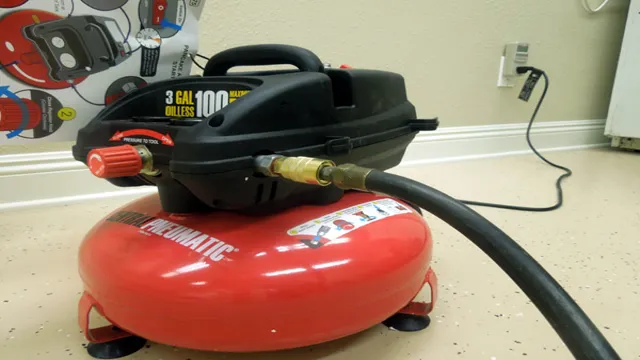
Have you ever wondered how much electricity your air compressor uses? It’s a common question among anyone who uses power tools, and for good reason. Knowing how much energy your compressor uses can help you save money on your electricity bill and choose a more energy-efficient model. But the answer can be complicated and depend on various factors such as the size of the compressor, the type of compressor, and how often it’s used.
Understanding the energy consumption of your air compressor can help you make informed decisions about your power usage and make sure you’re not overloading your electrical circuits. So, let’s get into the details of how much electricity does an air compressor use and what factors can impact its energy consumption.
Understanding the Basics of Power Consumption
As anyone who has ever had to pay an electricity bill knows, power consumption can be a major concern. When it comes to air compressors, it’s important to understand just how much electricity they typically use. The answer, of course, varies depending on the specific compressor in question.
However, it’s generally safe to say that air compressors require a significant amount of power to operate. This is because they need to create and maintain high levels of pressure, which requires a lot of energy. That said, there are ways to minimize the amount of power an air compressor uses.
For example, using a more efficient model or ensuring that it’s properly maintained and lubricated can help reduce energy consumption. Ultimately, it’s important to consider the power consumption of an air compressor before making a purchase or deciding how to use it. By doing so, you can ensure that you’re making an informed and responsible decision that minimizes your energy usage.
Watts, Volts, and Amps Explained
Power consumption is an important aspect of understanding electrical devices. In order to comprehend the basics of power consumption, one must understand the terms watts, volts, and amps. Watts measure the amount of power a device uses, volts measure the electrical potential difference between two points, and amps measure the flow of electrical current.
Just like a pipe that carries water, amps are like the volume of water that flows through the pipe, volts are like the pressure pushing the water through the pipe, and watts are like the amount of water that flows through the pipe in a specific amount of time. The relationship between these terms can be summed up by the formula watts = volts x amps. Understanding these concepts can help individuals make informed decisions about their energy usage and select appropriate electrical devices for their needs.
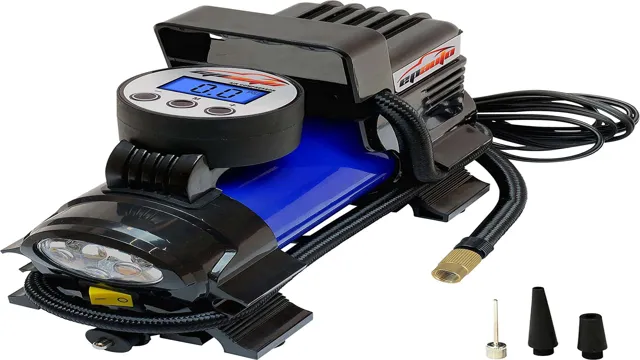
Calculating Power Consumption of an Air Compressor
When it comes to air compressors, calculating power consumption is essential for both long-term cost savings and maximizing performance. Understanding the basics of power consumption is crucial in this regard. By definition, power consumption refers to the energy consumed by an appliance or device when in use.
For air compressors, this translates to the amount of electricity they use to generate compressed air. Factors such as the size and type of compressor, as well as the amount of air needed, all affect power consumption. It’s important to consider these factors when choosing an air compressor to ensure that it is both efficient and cost-effective.
By calculating power consumption, you can ensure that you are making an informed decision and ultimately increasing the lifespan of your air compressor while reducing your energy bills.
Factors That Influence Power Consumption
If you are wondering how much electricity does an air compressor use, you need to factor in several different things. The size and horsepower of the air compressor are two of the main things that will determine its power consumption. You also need to consider how often you plan on using the compressor and for what purpose.
If you need to use it for extended periods or for heavy-duty applications, then it will use more electricity. The age and condition of the compressor can also be a factor, as older compressors may be less energy-efficient. Another thing to keep in mind is that some compressors come with energy-saving features such as auto shut-off or variable speed controls to help reduce energy consumption.
Ultimately, if you want to keep your energy costs low, it is essential to invest in the right compressor for your needs and use it efficiently.
Compressor Size and Horsepower
When it comes to choosing the right air compressor for your needs, two of the most important factors to consider are the size and horsepower of the machine. However, power consumption is also an important consideration, as a larger compressor with a higher horsepower rating will typically consume more energy than a smaller one. Factors that can influence power consumption include the type of compressor, the operating temperature and pressure, and the duty cycle of the machine.
Additionally, the efficiency of the compressor’s motor and the condition of the compressor’s components, such as the air filters and valves, can also impact power consumption. By carefully selecting a compressor with the appropriate size and horsepower rating for your needs, as well as maintaining the machine regularly to optimize its efficiency, you can minimize power consumption and save on energy costs over time.
Duty Cycle
Duty Cycle Duty cycle is an important factor when it comes to power consumption. It refers to the amount of time a device is active or being used versus the time it is idle or in standby mode. The higher the duty cycle, the more power a device consumes.
Several factors influence duty cycle, including the type of device, its function, and the level of usage. For example, a smartphone that is used for browsing the internet or streaming videos has a higher duty cycle than one that is used solely for texting. Similarly, a printer with a high print volume has a higher duty cycle than one used occasionally.
It is important to manage duty cycle to reduce power consumption and prolong the life of devices. Simple steps such as turning off devices when not in use or using power-saving features can go a long way in reducing duty cycle and saving energy.
Air Pressure Requirements
Air pressure requirements play a significant role in the power consumption of various machines and equipment. There are several factors that influence the energy consumption of a machine, such as the size and type of compressor used, the pressure setting, and the air demand. The compressor size plays a vital role in determining the air pressure and volume of air that it can produce.
A larger compressor with higher horsepower may have a higher air output, but it also requires more energy to run. Similarly, the pressure setting, which is determined by the type of machine and the required output, can also affect the energy consumption of the machine. Higher pressure requirements need more energy to maintain constant output, leading to higher energy consumption.
Lastly, the air demand, or the amount of air needed by the machine or equipment, can directly affect the compressor’s power consumption. The higher the air demand, the more energy required to maintain the required pressure. Therefore, understanding and optimizing air pressure requirements can help reduce power consumption and promote energy efficiency, leading to significant cost savings in the long run.
Measuring and Reducing Energy Consumption
Air compressors are an essential and common tool used in various industries. However, many people may wonder about their electricity consumption. So, how much electricity does an air compressor use? The amount of energy used by an air compressor depends on various factors like the compressor’s size, the pressure required, and usage duration.
The bigger the compressor, the more energy needed to run it. Also, if it is used for long hours at maximum pressure, it tends to consume more electricity. However, modern air compressors are designed to be more energy-efficient, and using certain strategies could help reduce electricity consumption.
For instance, maintaining the compressor correctly, using it only when necessary, and adjusting pressure levels can significantly lower electricity bills. Regular maintenance like keeping the air filter clean, checking for leaks, and replacing worn-out parts can go a long way in reducing energy consumption. So, if you are looking to reduce electricity usage by your air compressor, make sure to maintain it properly and use it wisely.
Using an Energy Meter
One of the most effective ways to reduce energy consumption and save on your electricity bills is by using an energy meter. This device helps you understand the amount of energy you are using and what appliances or devices are consuming the most energy. By monitoring your energy usage, you can identify areas where you can cut back and save money.
An energy meter works by measuring the flow of electricity in your home and providing real-time data on your energy usage. With this information, you can make informed decisions about your energy consumption and reduce unnecessary wastage. Think of it as a fitness tracker for your home’s energy consumption.
By understanding your energy usage, you can take control of your electricity bills and reduce your carbon footprint, making it a win-win situation for both you and the environment. So, if you want to take that first step towards saving energy and reducing your bills, consider investing in an energy meter and start monitoring your energy usage today.
Tips for Reducing Energy Use
Reducing Energy Use Are you looking for ways to reduce your carbon footprint and save money on your energy bills? One effective strategy is to measure and reduce your energy consumption. To get started, you can use a home energy monitor to track your energy usage and identify areas where you can make improvements. For example, you may notice that your heating and cooling system is using more energy than necessary, or that you have appliances that are constantly plugged in and consuming power.
By making small changes such as upgrading to a programmable thermostat or using power strips to limit standby power, you can significantly reduce your energy consumption and save money in the long run. Not only will this benefit the planet, but it can also increase the value of your home. So why not give it a try and make a positive impact today?
Conclusion and Final Thoughts
In summation, the electricity usage of an air compressor is dependent on a variety of factors, including the motor size, operating pressure, and frequency of use. It’s important to consider these variables when determining the cost of running an air compressor, and perhaps even more important to question why you need an air compressor in the first place. Are you a DIY craftsman or a professional mechanic? Or are you just an air enthusiast, inflating pool toys and practicing your Darth Vader impressions? Whatever the case may be, always be mindful of the energy you consume, and may the force not be too great with your electricity bill.
“
FAQs
What is the average wattage of an air compressor?
The average wattage of an air compressor is around 1500 watts.
How much electricity does an air compressor use per hour?
The electricity usage of an air compressor can vary depending on the model and type. However, on average, an air compressor may use around 7-10 kWh of electricity per hour.
Is it expensive to run an air compressor?
Running an air compressor can be expensive, especially if it is being used for extended periods. It is important to consider the electricity consumption and cost before running an air compressor.
What factors affect the electricity usage of an air compressor?
The electricity usage of an air compressor can be affected by various factors, such as the type and size of the compressor, operating pressure, duty cycle, and motor efficiency.
Can an air compressor be powered by solar energy?
Yes, it is possible to power an air compressor using solar energy. However, it would require a significant investment in solar panels and equipment to provide enough electricity to run the compressor.
How can I reduce the electricity usage of my air compressor?
To reduce the electricity usage of an air compressor, you can regularly maintain the equipment, check for leaks and pressure drops, and adjust the operating pressure according to the required workload.
What is the lifespan of an air compressor?
The lifespan of an air compressor can vary depending on the usage, maintenance, and quality of the equipment. However, on average, an air compressor can last up to 10-15 years with proper maintenance and care.

